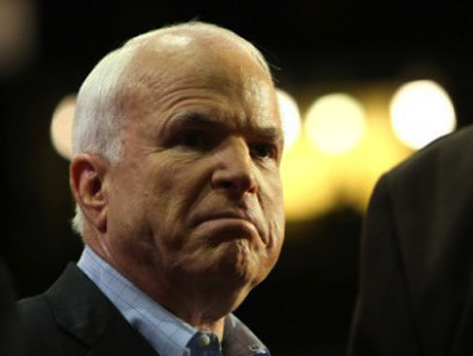
Sen. John McCain spent the weekend negotiating with Majority Leader Harry Reid on a deal to avert Reid’s threatened use of the “nuclear option” to change Senate rules to eliminate filibusters on Presidential nominations. Through his efforts, McCain was able to secure a complete GOP capitulation on 7 pending nominations. Reid secured all the benefits of exercising the “nuclear option” without the political cost of actually using it.
Under the McCain deal, the GOP will provide enough votes to secure the 60 votes needed for cloture and proceed to final consideration of the 7 nominees. In exchange, Reid agreed to replace two current union attorney nominees with two alternative union attorney nominees. McCain’s swift surrender ensures that the “nuclear option” is a permanent fixture of the nomination process.
GOP objections to many of the pending nominations were not minor. The first nomination to be approved under the McCain deal was Richard Cordray to be the first Director of the new Consumer Financial Protection Bureau. The CFPB was enacted under the Dodd-Frank legislation and holds sweeping powers over all aspects of the financial and credit sector.
When Cordray was first nominated two years ago, McCain and all but 2 GOP Senators signed a letter vowing to block any nomination unless reforms were made to the agency. A major concern was that Congress was specifically prohibited from exercising any oversight over the Agency’s budget. The promise to block that nomination wasn’t prompted by concerns about a specific nominee, but a fundamental political principle. McCain’s deal is further confirmation that principle are cheap in Washington.
Theoretically, McCain’s surrender preserves the right of Republicans to filibuster future nominations. Practically speaking, however, that right has been permanently ceded. If the GOP is willing to fold when it has serious objections to pending nominations, it will easily surrender again in the future the next time Reid threatens the “nuclear option.” If the GOP isn’t willing to draw a line over flawed nominees like Cordray or Thomas Perez, it never will be.
Reid believed that he could eliminate the filibuster for nominations with a simply majority vote. Democrat Sen. Carl Levin on Tuesday said he believed the change required 67 votes and stated he would vote against Reid’s rule change. It would have been better for the GOP to force Reid to vote on the change. Senators would have had to go on record whether they supported Reid or Levin’s interpretation of the rules. With a number of vulnerable Democrats up for reelection next year, a vote could have carried political consequences.
McCain, however, helped the Democrats avoid a risky political vote. He also ensured that he is on Harry Reid’s speed-dial the next time the GOP raises objections to an Obama nomination.

COMMENTS
Please let us know if you're having issues with commenting.